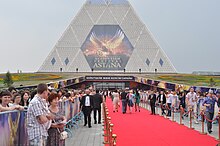Cinema of Kazakhstan
[8] Much of the great Soviet director Sergei Eisenstein's two part epic Ivan the Terrible was filmed in the Kazakh SSR.
[9] One of the major Soviet film schools, the Gerasimov Institute of Cinematography (VGIK), was also temporarily relocated to Alma-Ata during the war.
[14] The second, The Trans-Siberian Express (1977),[15] directed by Yeldar Orazbayev and set in 1927, featured a complicated plot involving the defeat of counter-revolutionaries planning to kill a Japanese businessman on a train bound for Moscow, on which our hero was masquerading as a cabaret manager.
Tsoi's character, Moro, returns to Alma-Ata to collect a debt from a lowly criminal, only to find out that his former girlfriend has become a drug addict.
In 1993, Nugmanov directed The Wild East, loosely based on Akira Kurosawa's Seven Samurai, involves a group of dwarves, runaways from the circus, who brings the magnificent seven to protects them from the predations of motorbike-riding Mongolian hoodlums.
[22] His Biography of a Young Accordion Player (1994) is a tale of a small boy growing up in a Kazakh village during World War II.
[23][24] A young driver from Almaty causes a minor motor accident when taking his wife and newborn baby back home from the hospital.
[24] Amir Karakulov has garnered critical praise for a number of films, including Homewrecker (1991), a tale of two brothers in love with the same girl.
His directorial debut was Renaissance Island (2004), a tale of the first love of an aspiring poet set against the historical backdrop of the desiccation of the Aral Sea.
Domestic distributors have preferred to rely a diet of dubbed Hollywood blockbusters and big-budget Russian movies, with the result that post-independence Kazakh cinema has developed something of a reputation a being more likely to be found in Western art houses and international competitions than on screens in Kazakhstan.
[27][28] Racketeer (2007), directed by Akan Satayev, about as a young Almaty in the tough economic climate of the 1990s, was billed as the first purely commercially oriented film made in the post-independence Kazakhstan, and proved a considerable box-office draw.
[30] His notable works made in Hollywood includes Wanted (2008), The Darkest Hour (2011) and Abraham Lincoln: Vampire Hunter (2012).


